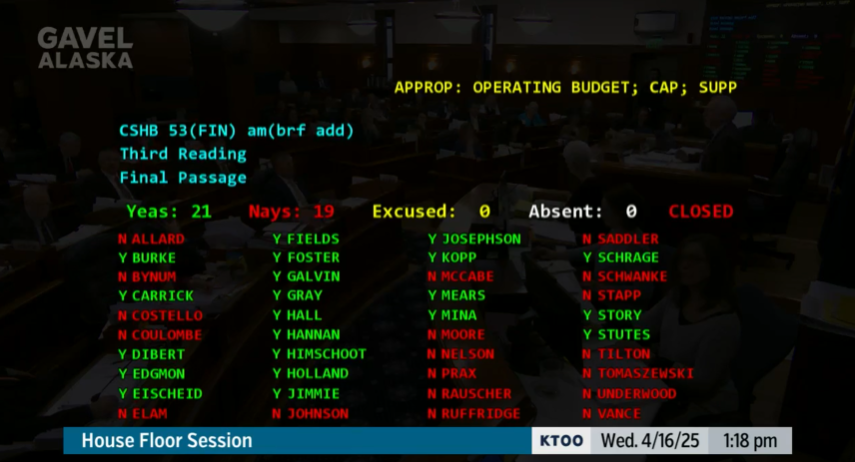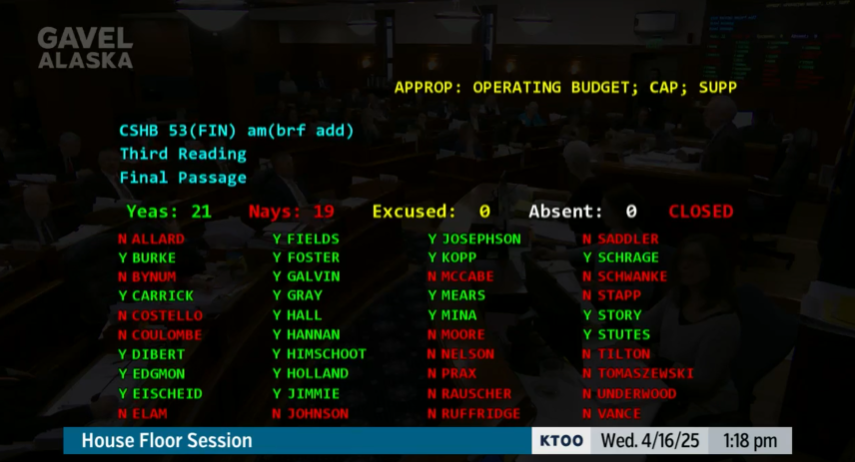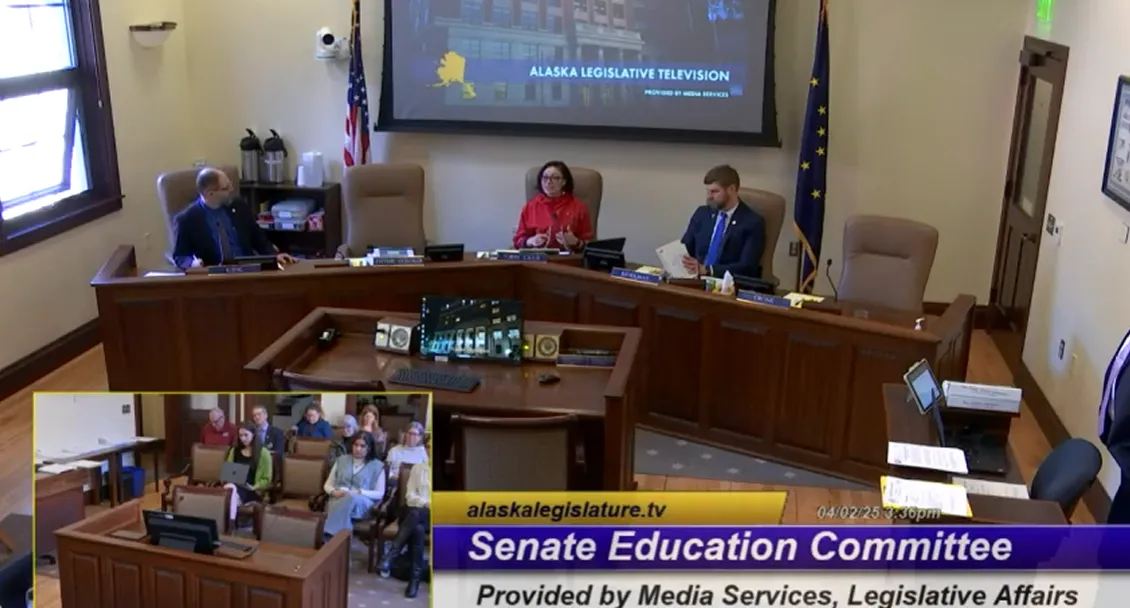House passes budget that needs more work, approves cellphone ban that doesn't ban cellphones
There's still a long way to go on the budget.

Good morning, Alaska! It's day 87.
In this edition: After several days of amendments, the House approved the operating budget on Wednesday, as the state's financial picture is looking a lot worse than it did when legislators began their work in January. Collapsing oil prices, financial market tumult and a general resistance to new revenues have left the budget with a roughly $450 million hole that, if it makes it through the Senate, will need to be paid for out of savings. The Senate's already signaled no interest in such a route, so there's much more to do. Following the vote, the House also approved a public school cellphone ban bill that no longer bans cellphones.
Current mood: 😴
House passes budget that needs more work

On a caucus-line 21-19 vote, the House approved a $6.2 billion operating budget without the necessary votes to tap savings to cover an anticipated budget gap of about $450 million. The struggle to get a balanced budget out of the House is nothing new in recent years, given the slim coalitions that have held the majority and the state's dismal financial situation. The House Minority Republicans' refusal to vote for the three-quarter vote to tap into the Constitutional Budget Reserve is also not surprising, given that it's one of the most powerful pieces of leverage that any minority will hold in a legislative session.
In the big picture, it's just a step in the larger process that will also see the Senate Majority – which is an old hand at tackling whatever budget emerges from the House – craft its version and the conference committee ultimately land the final version in the coming weeks. The Senate has already signaled opposition to spending from savings to balance the budget, so they'll have their work cut out for them with few dials to turn. The budget includes $86 million in additional K-12 funding over last year's figure, bringing it in line with the $1,000 increase to the state's per-student funding formula outlined in legislation approved last week (which has since been vetoed by Gov. Mike Dunleavy, in what has become a new annual tradition). There's also $950 million in spending on the dividend, which would pay out a relatively status quo amount of $1,400 PFD to Alaskans.
On the floor, the members of the House Majority cast the spending plan as a best-we-can-do-given-the-circumstances budget, making moderate but meaningful investments in things like education, public safety, the economy and care for vulnerable populations that they say are critical to the state's future.
"Easy on the eye and good for business," said House Majority Leader Rep. Chuck Kopp, R-Anchorage.
House Minority Republicans, many of whom were in the majority last year when they also passed a largely status quo budget with similar funding problems, harped against the budget and the overall process, complaining that they were locked out and their ideas on cuts were ignored. They also lambasted the House Majority for including a $78 million unallocated cut in the budget, which would leave the final decision-making on the reductions with the Dunleavy administration.
"We're going to pass a bill that makes a lot of promises to people — a lot of promises," said Fairbanks Republican Rep. Will Stapp. "And unfortunately, it's a bunch of promises that don't come with the one thing that guarantees them: money."
However, as several majority members like Fairbanks Democratic Rep. Ashley Carrick pointed out, those cuts were just a fraction of a fraction of what was needed to balance the budget, and larger discussions about revenue are needed.
"The truth is we can pull out of GeFONSI accounts, we can search through every nook and cranny of the UI (unemployment insurance) trust fund, we can even dip into AIDEA receipt authority, we can do all of those things and the end of the day, we're really just pulling out the couch cushions the little pennies we can find here and there for small bits and pieces of the overall budget picture," she said. "We are going to have to get a lot more honest about a lot of things besides just our spending. We're also going to have to get a lot more honest about revenues."
Many Republicans took exception with that, arguing that $10,000 here and a few million dollars in a $6.2 billion budget were still better than nothing. As pointed out in the ADN reporting, some of those attempted cuts included Big Lake GOP Rep. Kevin McCabe's $1.3 million savings by eliminating the Alaska Public Offices Commission, the state's campaign finance regulators, and Glennallen GOP Rep. Rebecca Schwanke's $17 million cut to the Divsion of Public Assistance, which is facing trouble with the feds after struggling mightily to deliver public benefits.
To many in the House Majority, those kinds of cuts were unacceptable and cut at the core services of state government.
"Some may argue that we should cut the fat. What fat is there? We are at the bone," said Anchorage Democratic Rep. Andy Josephson, who co-chaired the operating budget for the House Finance Committee, later adding a chippy line about the treatment of the minority in the process, "I think that folks were treated as well as I've been in the minority."
Follow the thread: The House debate on the operating budget
More coverage: Alaska Beacon, ADN
House approves cellphone ban that doesn't ban cellphones

Following the vote on the budget, the House voted to approve legislation that started out as a ban on cellphones in schools that, thanks to an amendment on Friday, is now more of a suggestion to ban cellphones in schools. An amendment by Rep. Justin Ruffridge, R-Soldotna, now simply requires school districts to have a policy on cellphones that allows, but doesn't require, them to ban their possession and usage during the day. The measure comes amid rising concern about the impact cellphone and social media usage has on young people (and everyone else, for that matter), but ran up against the pro-local control crowd, who argued the state shouldn't be involved in driving local decision-making.
"Teachers should make that decision, school districts should make that decision, school boards should make that decision," Ruffridge said. "It's not up to us to do."
It should be noted that several school districts have already adopted cellphone bans, and the state Board of Education has a draft model policy (albeit one that seems to be heavily reliant on studies hallucinated by AI). Rep. Zack Fields, D-Anchorage, carried the bill on the floor and pointed to several real studies that suggest a link between rising cellphone usage and adverse outcomes for young people, like suicide, depression and academic achievement.
While this measure won't require districts to ban phones, he said he hopes it nudges them in that direction and encourages them to at least study the issue.
The bill now heads to the Senate, where several members of the House said they hope it gets amped back up into a true cellphone ban.
Stay tuned.
Follow the thread: The House debates and passes cellphone "ban"
The Alaska Memo Newsletter
Join the newsletter to receive the latest updates in your inbox.



